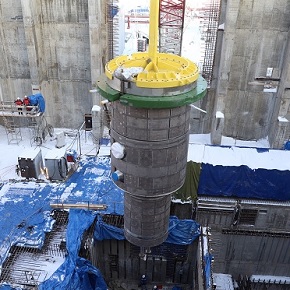 |
||
|
AUKUS - note verbale from China AtomInfo.Ru, PUBLISHED 25.03.2023 We publish a Note Verbale dated 20 March 2023 from the Permanent Mission of the People's Republic of China to the IAEA. China's Response to IAEA Director General's Statement in Relation to the AUKUS Announcement. China has taken note of the recent Joint Leaders Statement on AUKUS issued by the US, the UK and Australia. China expresses its grave concern and firm opposition to the continued advancement of nuclear submarine cooperation by the AUKUS partners, which is purely out of their own geopolitical interests, disregarding concerns of the international community. At the same time, China is seriously concerned about the IAEA Director General's Statement in Relation to the AUKUS Announcement, and firmly opposed to the US, the UK and Australia's coercing the IAEA Secretariat into endorsing their nuclear submarine cooperation by making safeguards exemption affangements on that cooperation. The AUKUS submarine cooperation has fully exposed the hypocrisy of the AUKUS partners on nuclear non-proliferation. The AUKUS nuclear submarine cooperation marks the first time in history for Nuclear-Weapon States to transfer naval nuclear propulsion reactors and large amounts of weapons-grade highly enriched uranium to a non-Nuclear-Weapon State. The existing IAEA safeguards system cannot ensure effective safeguards on such activities. Therefore, such cooperation poses serious nuclear proliferation risks, and contravenes the object and purpose of the NPT. The AUKUS partners claimed that they will set the highest nuclear non-proliferation standard, and are actively seeking to reach a safeguard anangement with the IAEA Secretariat. In essence, they are coercing the Secretariat to make a exemption in safeguards, which seriously damages the Agency's authority and deals a blow to the safeguards system. If the AUKUS partners insist on taking their own course, it is inevitable that some other countries will follow suit, which may eventually lead to the collapse of the international nuclear non-proliferation regime. The AUKUS partners have no right to make decision for all IAEA Member States on safeguards related maffers of the AUKUS nuclear submarine cooperation. The AUKUS nuclear submarine cooperation concerRs the authority, integrity and effectiveness of the NPT. Safeguards to such cooperation involves complicated political,Iegal, and technical issues, raises high controversy in the international community, and concerns the interests of all IAEA Member States. Therefore, it should be discussed by all interested Member States through a transparent, open and inclusive intergovernmental process, with reference to past practices of strengthening the IAEA safeguards system. Pending a consensus reached by all Member States, the AUKUS partners should not proceed with their nuclear submarine cooperation, and the Secretariat should not negotiate with them on relevant safeguards arrangements. It is imperative for the AUKUS partners to heed the concerns of the intemational community as well as regional countries, abandon their outdated Cold War zero-sum mentality, cease bloc politics and confrontation, refrain from putting their geopolitical interest above nuclear non-proliferation obligations, and stop coercing the Agency into endorsing their nuclear submarine cooperation. The inclusion for seven consecutive times of relevant item in the agenda of Board of Governors and General Conference fully proves the concerns of the international community on the AUKUS nuclear submarine cooperation. If the AUKUS partners are sincere in fulfilling their nuclear non-proliferation obligations, they should support the intergovernmental discussion process within the Agency, rather than imposing their decisions on all Member States. China is firmly opposed to Australia's request to commence negotiation with the Secretariat on relevant safeguards affangement under Article 14 of its Comprehensive Safeguards Agreement. Albeit Article 14 stipulates that the use of nuclear materials in "non-proscribed military activities" does not require safeguards, but there has been no consensus on the definition of such activities. It is also important to note that there is a significant divergence of views on the interpretation of Article 14, inter alia, whether it is consistent with Article 2 of the Statute, whether it is applicable to weapons-grade HEU in "transferred" power reactors for nuclear submarines, and whether effective safeguards arrangements can be formulated under it. The safeguards arrangement between Australia and the Agency to be concluded under Anicle 14 will constitute a precedent, involving the interests of all Member States. Therefore, issues related to such an arrangement should be firstly discussed by all interested Member States through an intergovernmental process, with a view to seeking consensus and with reference to the Agency's past practices of strengthening the safeguards system, rather than a clandestine negotiation between certain Member States and the Secretariat. China urges the Secretariat to strictly abide by its mandates in the Statute, earnestly assume the responsibility of non-proliferation, and do not endorse the nuclear proliferation activity of the AUKUS partners. Other news: 422 nuclear units are operating in the world, 56 units are under construction Kuosheng-2 was permanently shutdown. Decision to terminate contract for construction of Hanhikivi-1 NPP unlawful Dispute Review Board confirmed that Fennovoima Oy had unlawfully terminated the EPC contract for the construction of Hanhikivi-1 NPP. AtomExpo-2022: electric propulsion as a new paradigm Private business is quite capable of doing light things, and a state-owned company should take on complex redevelopments. |
Hero of the day 
ROSATOM installs vessel of MBIR research reactor in design position On January 18, the vessel of the world's largest multipurpose fast neutron research reactor (MBIR) was installed in its designed position at the Research Institute of Atomic Reactors (RIAR) construction site in the city of Dimitrovgrad in Russia's Ulyanovsk region. RIAR is a part of ROSATOM's scientific division "Science and Innovation, JSC". INTERVIEW
AtomInfo.Ru OPINION
Rosatom |

